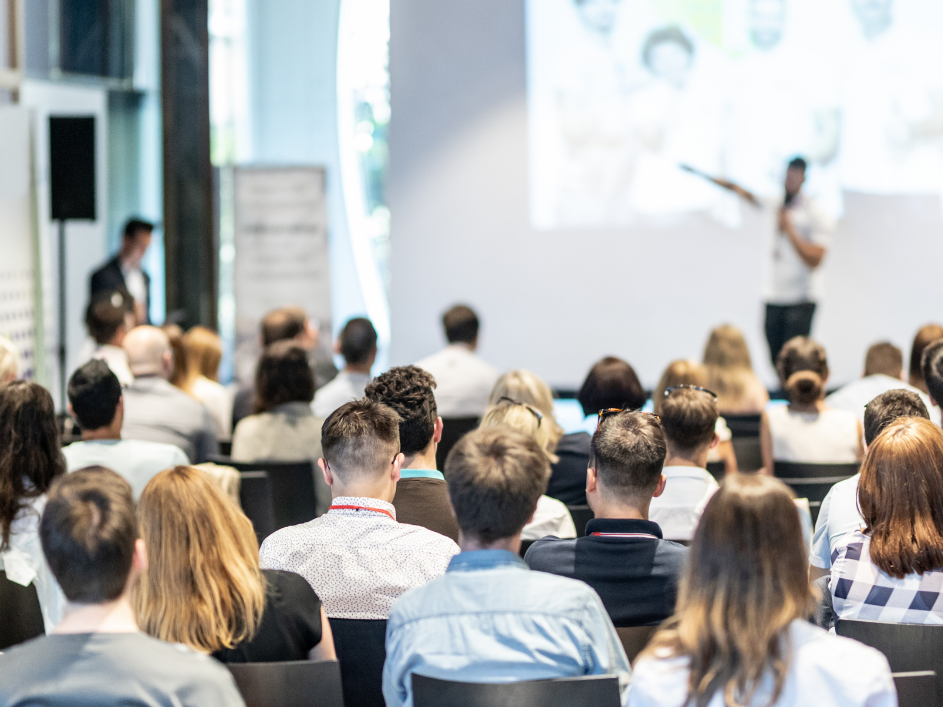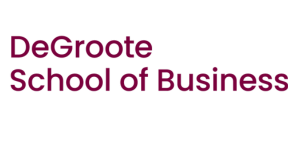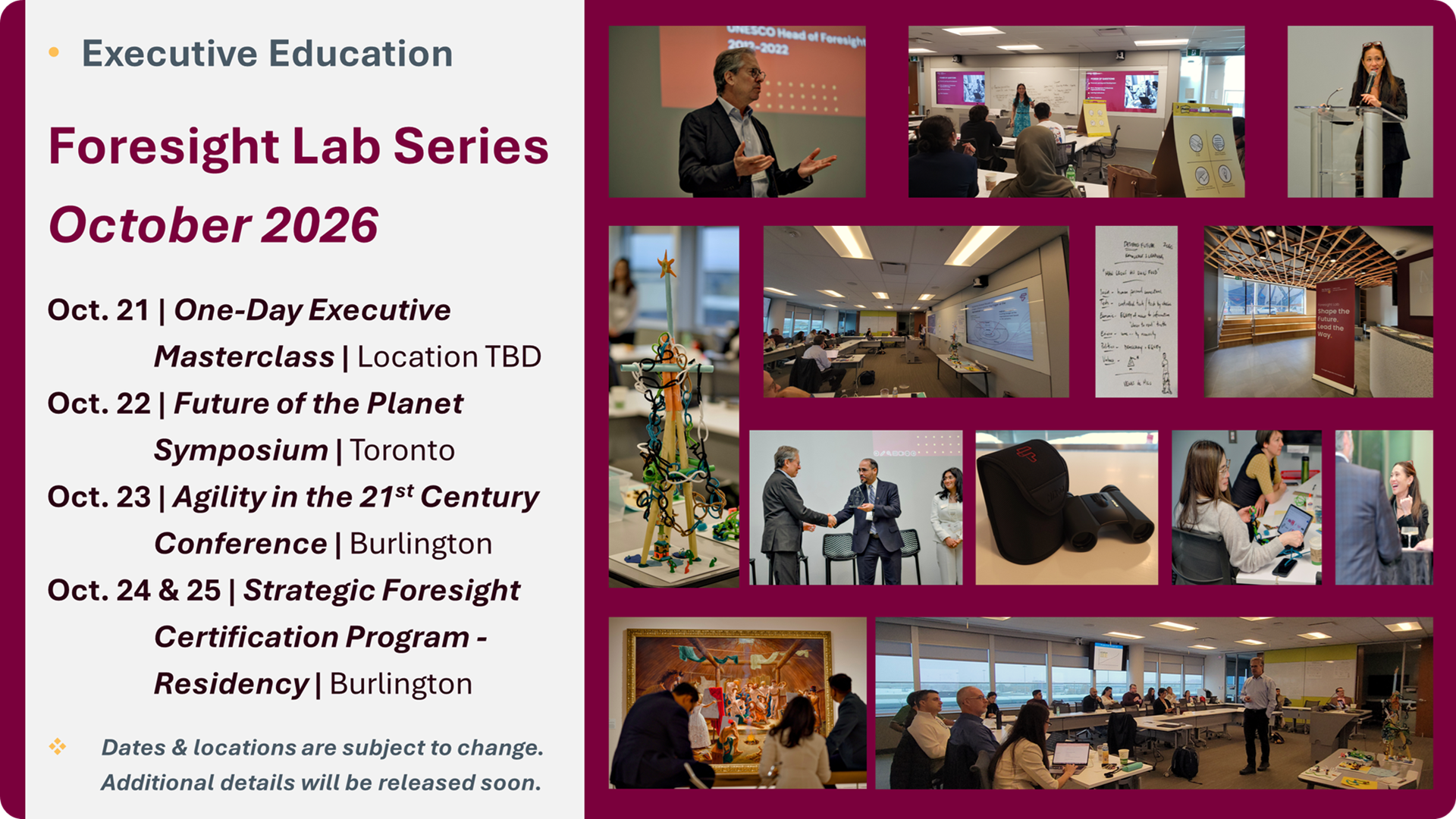
Foresight Events

The Foresight Lab’s event series brings together today’s most innovative thinkers, influential leaders, and curious minds to explore the complex issues and trends defining the decades ahead. Designed to complement our interdisciplinary programming, these events dive deep into the emerging forces reshaping our world—from the evolution of work and competitiveness, to financial equity, intangible economies, and global demographic shifts.
Each event is a chance to engage with pressing questions about the future of Canada and the global landscape, offering participants a platform to learn, reflect, and connect. Whether you’re a student, professional, policymaker, or future-minded change-maker, our events are built to expand your perspective and strengthen your capacity for long-term thinking and adaptive leadership.
Browse our latest thought-provoking sessions below and join us as we imagine—and build—a better future, or join our mailing list to stay informed about upcoming events and new insights from the Foresight Lab.
Upcoming Events
Past Events
The Foresight Lab has hosted a dynamic series of events that explore the intersection of strategic foresight and real-world decision-making. These gatherings have brought together thought leaders, practitioners, and curious minds from various sectors to engage in forward-thinking dialogue and hands-on learning. From immersive workshops to expert-led panels, each event has been designed to cultivate future literacy and spark meaningful insights. The response from participants has been overwhelmingly positive, with many highlighting the relevance, depth, and practical value of the sessions.

I thoroughly enjoyed the session for many reasons. Firstly, … (y)our session enabled me to see past the current circumstances and think about focusing on what is within our control and constraints we can manage or shift… Secondly, (t)his opportunity to connect with and hear from other business leaders was a refreshing reminder that strategy development does not happen by accident or without intention. Lastly, … engag(ing) with other business leaders about their challenges or priorities…always brings another dimension to my own thinking that elevates opportunities for planning…
Is the traditional MBA still relevant in a rapidly evolving business world?
Our current educational landscape is far from predictable. Higher education is facing disruptions on multiple fronts: the rise of emerging technologies – most notably generative AI; shifts in the nature of work and compensation; financial pressures confronting many institutions; growing skepticism about the relevance and value of advanced degrees; and mounting student debt. All of these factors are forcing a fundamental re-examination of higher education in the 21st century.
At the Foresight Lab, we brought together students, alumni, faculty, and foresight practitioners to take a deep dive into the future of management education. Using a variety of foresight techniques, we challenged participants to reimagine the MBA and explore the underlying assumptions that shape our higher education institutions.
Several thought-provoking ideas emerged from these sessions: a strong desire for community-based learning that combines theoretical business concepts with passion-driven, purpose-oriented learning and practical outcomes. As digital learning becomes more widespread, meaningful human interaction is increasingly sought after as a crucial source of connection and personal growth. Mentorship -and the desire to pass on one’s legacy – has emerged as a compelling means of cultivating the next generation of leaders. This points to a shift away from traditional, structured learning models and toward more customized, relationship-based approaches.
Futures literacy and foresight tools proved to be powerful mechanisms for empowering participants to challenge the status quo. They encouraged the surfacing of fringe ideas or “idyllic” concepts that may initially seem infeasible, but upon deeper reflection, deserve serious consideration.
The Foresight Lab surfaced several critical and provocative questions that must be addressed in charting the MBA’s future. Chief among them: Does accumulating more credentials automatically lead to greater success? Should the classroom, as we know it, remain the central mechanism for leadership development? Could coaching become the new classroom? Should MBA become more personalized, allowing learners to curate their own learning pathways?
It is often not just our inability to think about the future, but our lack of courage to go beyond incremental thinking that limits us. Without bold imagination and strategic foresight, we risk missing the opportunity to drive transformative change—and to chart a new course for the future of management education.
Futures literacy is a foundational skill for building strategic thinking capability. It challenges us to question our taken-for-granted assumptions, to see beyond the immediate and obvious, to appreciate diverse perspectives, and to summon the courage to imagine what may seem improbable. These abilities unlock our capacity to recognize emerging opportunities and to develop agility and confidence in the face of uncertainty. Without the ability to see beyond our own limited beliefs and unconsciously adopted worldviews, we risk being blinded to possibilities, innovation, and the transformation needed to thrive.
In April 2025, executives from higher education, banking, courier, consulting, and public administration sectors participated in our Futures Literacy Masterclass for an exceptional opportunity to explore the latest advances in futures thinking, offering a unique window into a new and rapidly emerging field called ‘futures literacy’, which empowers organizational strategic foresight capability for sustainable performance.
“The Executive Strategic Foresight Masterclass empowers senior leaders to seed futures literacy across their organizations. It equips them with frameworks to diagnose and reframe today’s challenges in the context of tomorrow’s possibilities, enabling their organizations to strategically innovate and create ‘future-proof’ competitive advantage.” – Ashley Beattie, Head of AI, Agile by Design
“I thoroughly enjoyed the session for many reasons. Firstly, I have found that the marketplace in general is in a state of negativity given all that is happening both economically and politically. Your session enabled me to see past the current circumstances and think about focusing on what is within our control and constraints we can manage or shift. I came to the session feeling somewhat negative and left with a renewed sense of optimism. Secondly, as a business leader, there is often very little time to spend thinking about the business rather than working in the business. This opportunity to connect with and hear from other business leaders was a refreshing reminder that strategy development does not happen by accident or without intention. Lastly, any time I have had the opportunity to engage with other business leaders about their challenges or priorities, it always brings another dimension to my own thinking that elevates opportunities for planning. I found the other participants to be highly engaging and insightful and appreciated the opportunity to make new connections as well as renew some prior connections.” – Ruth Todd, National Private Enterprise Leader & Regional Managing Partner, Regions East, KPMG Private Enterprise
In today’s evolving banking landscape, the imperative for fairness in financial services is paramount. Despite the universal need for banking services, disparities in access and treatment persist, posing challenges to achieving financial inclusion for all Canadians. Our symposium aims to address these challenges head-on by fostering dialogue among industry leaders, academics, policymakers, and other stakeholders.
The COVID-19 pandemic exposed critical vulnerabilities in global supply chains, from material shortages to delayed shipments and rising costs. As businesses continue to navigate ongoing disruptions including geopolitical tensions and energy crises, resilience, innovation, and sustainability have become essential priorities. The event was joined by leading industry experts and academics as they discussed practical strategies to future-proof supply chains, including friend-shoring, digital transformation, workforce development, and sustainable practices. Organizations like Purolator shared how they were adapting to new realities and building agile, customer-centric supply networks for a rapidly changing world.
Reach out if you want to learn more about any event.
"*" indicates required fields


